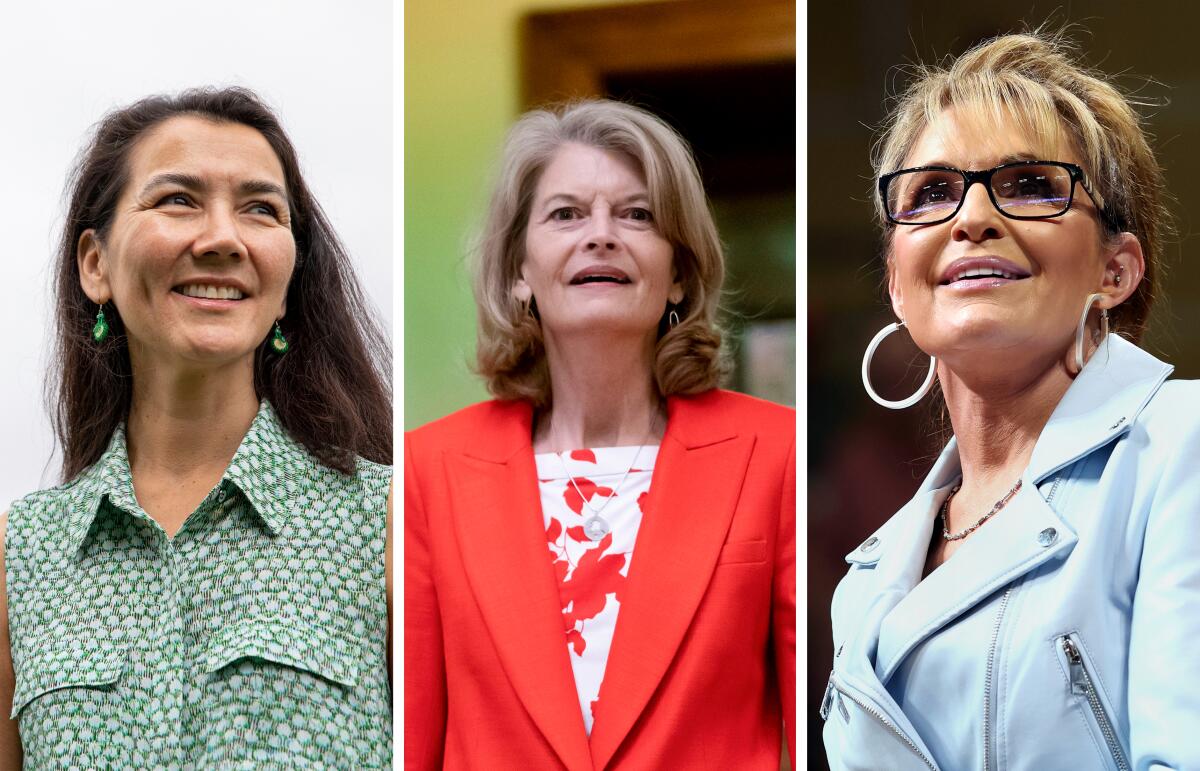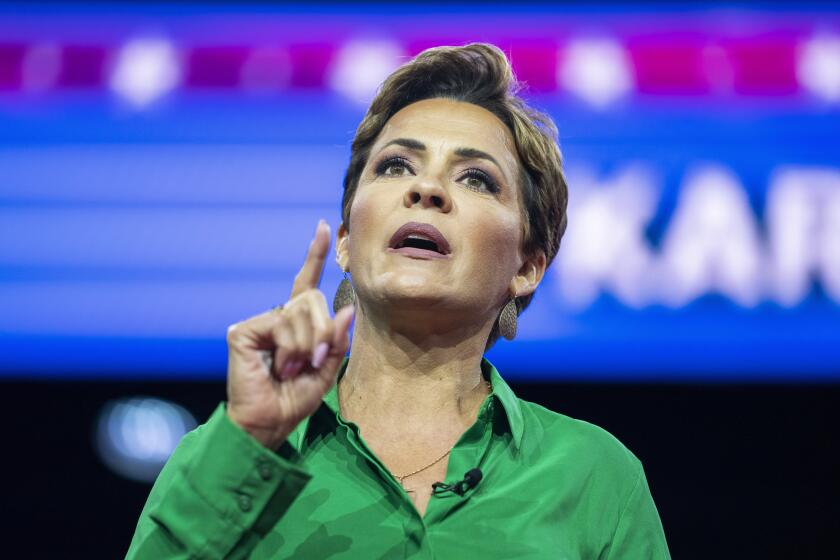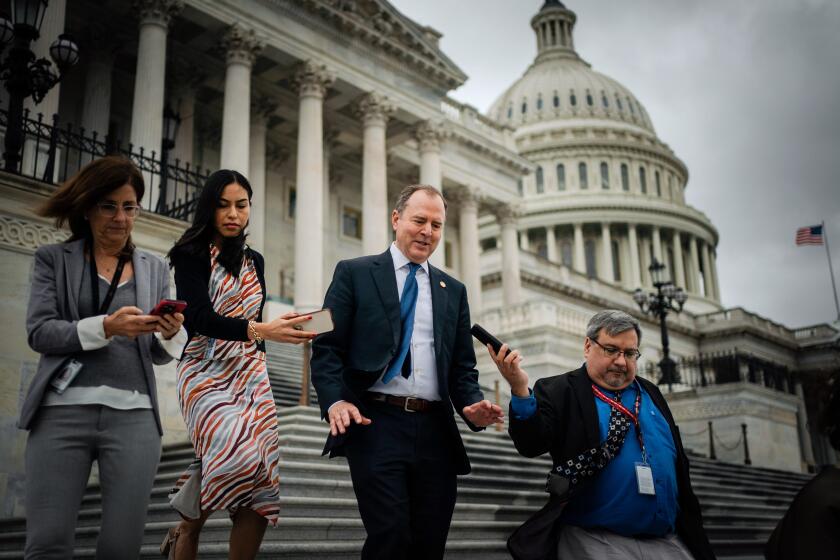Think our politics stink? Look north — to Alaska

- Share via
Last year, Alaska tried something unique.
It became the first state to use an election system that placed all candidates on the same ballot, with the four top vote-getters, regardless of party, moving to a runoff where voters ranked their preferences.
(Go ahead, impress friends at your holiday barbecue by using the technical terms, blanket ballot and ranked-choice voting.)
One purpose of the system, approved by voters in 2020, was to weed out extremists by making it harder for candidates to be elected simply by appealing to the hard-liners of their party’s base.
It worked splendidly.
Sen. Lisa Murkowski, a relatively moderate mainstream Republican, won reelection in November by defeating a MAGA fundamentalist trying to avenge Murkowski’s vote punishing President Trump for the Jan. 6 insurrection.
The state’s sole House seat was captured by Mary Peltola, a relatively moderate mainstream Democrat, who thwarted a comeback bid by the far-right pugilist Sarah Palin.
Alaska is a place apart, both physically and in the minds of its many freethinking residents. The state — the second to last to join the union, followed by Hawaii — is both conscious and proud of its separateness, embodied by the way many there refer to the rest of the country at arm’s length, as “Outside.”
So it seems improbable, given that distance, that Alaska offers a model — or, at least a step forward — for dealing with the polarization wracking the country and turning our politics into a constant spectacle of partisan eye-gouging and face-clawing.
But that looks to be the case.
She refuses to admit defeat in the Arizona governor’s race, making false claims of fraud and conspiracies. A GOP election official’s defamation suit may hold her to account.
Here’s how ranked-choice balloting works:
In a typical election, the candidate with the most votes wins. Under the ranked-choice system, if no candidate receives a majority of first-choice votes, a new round of tabulation begins. The candidate with the poorest showing is eliminated and those votes are awarded to their supporters’ second pick. The process continues until someone receives a majority.
The notion is that by competing en masse not just to finish first but also to be voters’ second choice, successful candidates will have to appeal to a broader segment of the electorate.
As experts recently explained in the Anchorage Daily News, “Encouraging politicians to take more extreme views ... [makes] our legislatures increasingly dysfunctional. Instead of meeting in the middle to find solutions both sides can live with, they drive legislators further apart and make it harder to agree.”
The most recent session of the Alaska Legislature proved instructive.
There was less reflexive partisanship and more cooperation across party lines, those experts said, attributing the change to the state’s revamped voting system. They cited the budget lawmakers passed and, in particular, the agreed-upon disbursements from the state’s Permanent Fund, an account that pays residents annual dividends from Alaska’s oil wealth.
Writing in the Anchorage paper, political scientists Glenn Wright, David Lublin and Benjamin Reilly noted the dividend was smaller than many Republicans would have liked, but that left more money for education and programs that others preferred.
“A classic political compromise,” they called it, suggesting that “rather than spending their time bashing the other party,” lawmakers chosen under the new system reached across the aisle and bargained to reach a consensus.
Which, ideally, is how legislating works.
Naturally, ranked-choice voting has become a source of political contention. (These days what isn’t?)
Much of the criticism is coming from the right, where opponents aggrieved by Palin’s loss and Murkowski’s victory have lumped the issue with such culture-war standbys as critical race theory and gender identification, as well as the fear of supposedly rigged elections.
“They keep preaching that a man can get pregnant until we believe it,” Art Mathias, an Anchorage church leader who is heading a drive to repeal ranked-choice voting, said at a rally kicking off the signature-gathering effort. “We got to get engaged, or it’s gonna get worse.”
But the fight over ranked-choice voting doesn’t cleave neatly along partisan lines.
Several cities in deep-red Utah allow it. Virginia Republicans used the system to chose their gubernatorial nominee in 2021, boosting Glenn Youngkin over a Trumpy alternative and helping the GOP claim the governor’s office for the first time in a dozen years.
Still, it’s not hard to discern a red-blue divide.
The GOP rebuke boosts the Burbank Democrat’s political stock, improving his odds of besting party rivals to succeed Dianne Feinstein as California’s next U.S. senator.
GOP lawmakers in Idaho, Montana and South Dakota this year passed legislation to prevent ranked-choice voting, joining Tennessee and Florida, which approved bans in 2022.
Democrats have tended to look upon the system with greater favor. In Oregon, lawmakers put a measure on the November 2024 ballot asking voters whether ranked-choice voting should be implemented for state and congressional elections.
Nevada voters will also take up the question again next year, after ranked-choice voting was approved last November. (The move would amend the state constitution, so it requires passage a second time.)
Despite claims the system is stacked against conservatives, blanket ballots and ranked voting don’t automatically favor one party over the other. It doesn’t even stop strongly ideological candidates from winning, so long as they gain majority support.
Alaska’s conservative Republican governor, Mike Dunleavy, was reelected in November, the political scientists noted, and Rep. David Eastman, a member of the extremist Oath Keepers, was returned to the state Legislature.
Alaska is just one state — and an idiosyncratic one at that.
But the effort to promote consensus and elevate a less performative, more problem-solving approach to politics sets a good example.
More places should try it.
More to Read
Get the L.A. Times Politics newsletter
Deeply reported insights into legislation, politics and policy from Sacramento, Washington and beyond. In your inbox twice per week.
You may occasionally receive promotional content from the Los Angeles Times.













